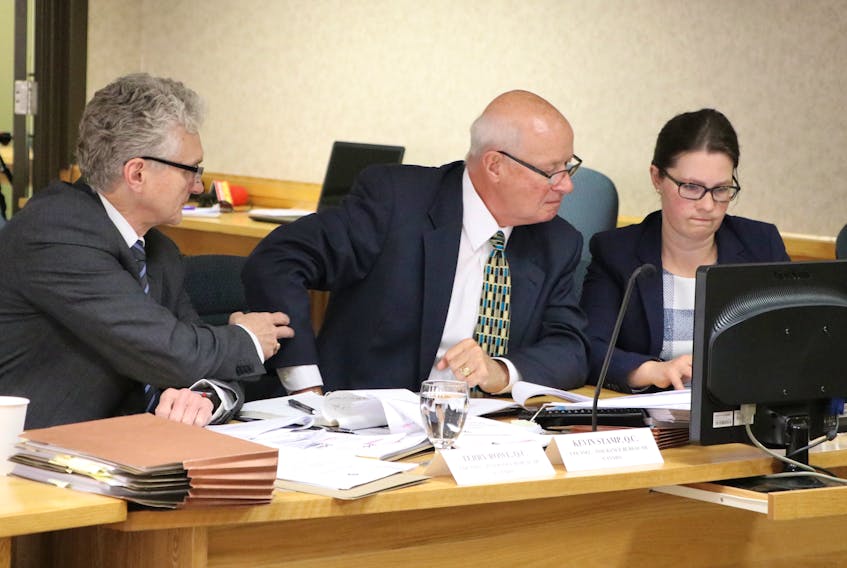As lawyers, witnesses and commissioners make their way through a sea of reports and information at the Public Utilities Board (PUB) hearings this week, one thing is becoming clear, says Consumer Advocate Dennis Browne — the province’s automobile insurance system can no longer carry on business as usual.
Browne said insurance rates continue to increase for consumers in Newfoundland and Labrador, and change is greatly needed.
“Right now the law mandates a $2,500 deductible on all claims (in this province) and that seems to be an outlier in Canada,” Browne said. “There’s no system like that anywhere else.
“It seems like, perhaps, we are moving in the direction of a cap, but the evidence is early yet and we have a lot of other witnesses to go through, but clearly what we are finding here right now is that we can’t have business as usual. Business as usual means rates continue to go up for consumers without any benefits.”
The possibility of placing a cap on compensation for minor injuries suffered by victims of automobile-related accidents in the province has been front and centre during the hearings.
Those representing accident victims argue it would take away their right to sue for fair compensation, while companies believe it will help stabilize rates and reduce claims costs.
Browne said imposing a compensation cap would mean consumers would give up some of their rights. And that, he said, should only come if there are benefits to consumers, such as a reduction in premiums.
Another option, he said, is to impose a cap on the rate of return insurances companies receive, as well.
“If the consumers are to give up any rights, there will have to be a rate reduction and a consistent rate reduction, and we also need to look more closely at the rate of return that insurance companies are realizing,” he said. “That is a very important aspect to all of this. In terms of electricity and utilities, they make an 8.5 per cent rate of return in this province. We will be looking at that rate of return (for insurance companies) and maybe we need to put a cap on the rate of return of a lot of these insurance companies, as well, and consumers will get the benefit of that.”
Actuary consultant company Oliver Wyman was asked by the PUB to prepare a number of reports for the PUB’s automobile insurance review. Lawyers have been questioning Oliver Wyman principal Paula Elliott all week on the contents of the reports, including how the data was collected, and the assumptions and conclusions arrived at in the reports.
On Thursday, Elliott was questioned on “Minor Injury Reform Cost Estimates — Private Passenger Automobiles.”
The report estimates the cost impact on third party liability/bodily injury claim costs and premiums arising from the use of private passenger automobiles if the non-pecuniary payment was capped for claimants with a minor injury.
The report notes the Government of Newfoundland and Labrador is considering three alternative cap levels — $5,000, $7,500 and $10,000 — that would limit the amount paid for non-pecuniary loss to claimants identified as having suffered a minor injury.
Colin Feltham, a lawyer representing the Campaign to Protect Accident Victims, questioned Elliott on information in the report indicating that at a cap level of $7,500, insurance companies would save 53 per cent of the total settlements paid out on minor-injury claims.
“For minor-injury claimants only, forgetting all claimants for a moment, under the $7,500 cap the insurance companies would save upwards of 53 per cent of the total settlements amounts that otherwise would have been paid to so-called minor-injury claimants, that’s what that’s saying,” Feltham said, referring to a part of the report.
“Well, that’s the estimate, correct, for the sample that that reduction anticipated,” Elliott replied.
“And the consumer in Newfoundland and Labrador … their savings annually under a $7,500 cap might be less than $100,” Feltham said.
“Right, the math is all connected, so we take what’s paid in total now, the aggregate costs and reduce them by the percentages as per Table 1 and then convert that to a premium level before or after the reform to calculate that, that’s correct,” Elliott said. “And the reduction in premium applies to all policy holders.”
Also noted in the report, the introduction of a minor-injury compensation cap might influence the propensity for people suffering minor injuries to report and pursue a claim. It is reasonable to expect, the report suggests, that there is a correlation between the cap amount and the likelihood that a claim is not reported — the lower the cap amount, the higher the likelihood the claim is not reported and pursued.
Browne said the information so far at the hearing — including information on what happened in Nova Scotia and New Brunswick after those provinces imposed compensation caps — indicates that many people might not pursue minor-injury claims.
“If there is a cap, perhaps, and the cap is $5,000 or $7,500 or $10,000 a lot of claims might be settled at the adjuster level on minor injuries,” Browne said. “Now we are only talking about minor injuries, something like a strain, a wrist problem, something of a particularly minor nature and these will all be defined in law. It does not affect major injuries. People will still be bringing their claims for major injuries, particularly to lawyers, I think. That’s where injuries of that nature belong. It doesn’t belong at the adjuster level.”
Browne said the option in Newfoundland and Labrador of increasing the deductible to $5,000 or $10,000 is unheard of in Canada.
“We know right now, where caps have been introduced, the number of claims, the cost seems to be going down,” he said. “And that’s probably based on the fact that a lot of people who have minor injuries may not come forward if they know there’s a cap in place for $7,500 or $10,000 in reference to their minor injury.”









